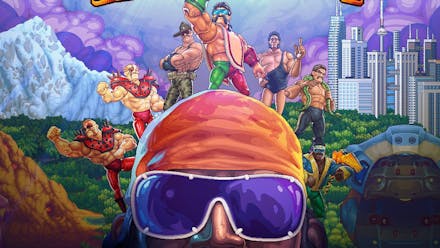Platforms: PC, Nintendo Switch, PS4, PS5, Xbox Series X|S
Hey brother! Remember when professional wrestling was the most electrifying, dynamic, and thrilling dose of sports entertainment you could plug into your eyeballs on a Saturday afternoon? When the likes of Macho Man Randy Savage, Jake 'the Snake' Roberts, and the Road Warriors dominated the rings with over-the-top personas and exaggerated feuds over shiny waist wear? Well, developer Mega Cat Studios remembers, ohhh yeaaah! (Ahem.)
The studio is also apparently staffed with connoisseurs of classic JRPGs, since WrestleQuest is an unlikely fusion of the late SNES heyday of that genre with the golden age of the rope-opera. The madness doesn't end there though, as the central journey to become the greatest wrestler in the world is all played out by toys, making this the video game equivalent of throwing all your childhood action figures on the floor and smashing them together.

Mega Cat does a fantastic job of merging its disparate influences, with the wrestling and RPG aspects feeding into and influencing the other. Pro-wrestling provides the framework for the world and story, following aspiring champ Randy “Muchacho Man” Santos – no points for guessing the inspiration – and established wrestler Brink Logan (more an homage to the likes of Bret 'Hitman' Hart, right down to coming from an esteemed wrestling dynasty) on their own paths to glory, with plenty of puns and references along the way. RPGs provide the backbone of combat, with matches in the squared circle taking a turn-based approach, and exploration with a top-down pixel art aesthetic reminiscent of the likes of Chrono Trigger or earlier Final Fantasy epics.
Certain key choices see you edging towards being a ‘face’ or a ‘heel’ to the audience.
Although the turn-based battles here aren't as intricate as the likes of Trails Into Reverie, they're not an entirely stripped-back trading of blows either, with quick-time prompts for attacks and counters more than capable of turning the tide of any match. While it'll all still feel familiar to fans of classic JRPGs, the combat system is brilliantly reshaped in pro-wrestling's image. Forget spells; here you have ‘gimmicks’, the signature moves of each character, such as Muchacho Man's “South of the Border Stunner” piledriver, or teacher doll Barbae's “Chemistry Class” that sets all rivals on fire. Summons are gone, replaced by calling on your manager for some ringside interference, while party attacks are – of course – elaborate tag team moves. And, although regular battles against grunts can be won by simply depleting enemy health, rival wrestlers must be pinned with a three count, a nice twist that keeps the wrestling motif front and centre.
The RPG factor extends beyond battles too. It's found in character customisations, with upgradeable body parts affecting the stats for each of your action figure heroes. It's a clever touch that leans into the toybox fantasy of the game, with wrestlers that can be kit-bashed with parts found from other toys. Choices in smack talk before key matches can also impact enemy motivation ahead of battles, and you can even customise your entry walks and music for maximum hype – hype itself an important factor in keeping the crowd riled up in your favour. There's even a very basic morality system, where certain key choices see you edging towards being a ‘face’ or a ‘heel’ to the audience.

WrestleQuest does rely a little too heavily on its central schtick though, almost to the extent that the constant barrage of pro-wrestling gags and references begin to feel like a sticking plaster over a lack of polish. There's a half-hearted attempt to feature spoken dialogue, but only in the form of the same potted lines repeated ad nauseum whenever you speak to supporting characters, regardless of the actual on-screen text. Then there are a few too many half-baked mini-games scattered throughout, such as a Dance Dance Revolution-style one that borrows the aesthetic – directional arrows rising while club music plays – but not the mechanics, with no connection to the rhythm or beats of the music itself.
Certain aspects of the game are poorly explained too, such as those aforementioned tag team moves. Each character involved in a move needs to learn the skill separately before you can use it in battle, but this is never detailed. The result being, you'll see one character gain a gimmick when levelling up, then see no sign of it in the ring until the corresponding partner also gains it, which seemingly happens at random.
Despite this, WrestleQuest packs in plenty of charm across its 30-odd hour saga, and it's hard not to get on board with its often glorious cheesiness. It's also a far more original approach to adapting wrestling to video games than making yet another standard grappler. Those with nostalgia for the particular era of both the sport and the RPGs it’s homaging will get more from the game, though.
